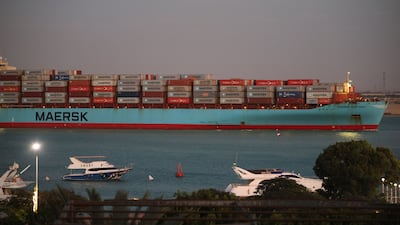Live updates: Follow the latest news on Israel-Gaza
Shipping major Maersk is preparing to resume operations in the Red Sea after the launch of a US-led operation aimed at ensuring the protection of vessels in the area.
The Danish company suspended the use of the Bab el-Mandeb strait earlier this month after attacks by Yemen's Houthi rebels on ships passing through the area.
"We have received confirmation that the previously announced multi-national security initiative Operation Prosperity Guardian (OPG) has now been set up and deployed to allow maritime commerce to pass through the Red Sea/Gulf of Aden and once again return to using the Suez Canal as a gateway between Asia and Europe," Maersk said on Sunday.
The company is now preparing to allow for vessels to resume transit through the Red Sea both eastbound and westbound, it said.
"We are currently working on plans for the first vessels to make the transit and for this to happen as soon as operationally possible," it said.
Several countries, led by the US, agreed last week to jointly carry out patrols in the southern Red Sea and Gulf of Aden to safeguard commercial shipping after many companies decided to halt their operations in the region.
The UK, Canada, France, Italy, the Netherlands, Norway, Seychelles and Spain will take part in the OPG initiative. Bahrain is the only Arab country in the international task force.
Maersk, Hapag-Lloyd, CMA GGM and the Mediterranean Shipping Company (MSC), the four companies that collectively control about half of the global container shipping market, stopped operating in the Red Sea this month.
British oil company BP also stopped all of its operations through the Red Sea, which it called a “precautionary pause under ongoing review” due to the "deteriorating security situation”.
"Our teams are still assessing the immediate effects of the resolution, and we kindly request your patience while we understand the impact it will have in terms of diverted vessels, surcharges, booking acceptance and further contingency measures," Maersk said on Sunday.
It also stressed that although security measures are in place, "the overall risk in the area is not eliminated at this stage".
"Maersk will not hesitate to re-evaluate the situation and once again initiate diversion plans if we deem it necessary for the safety of our seafarers."
Maersk had said on Tuesday that its vessels would sail around the Cape of Good Hope to avoid the Red Sea and the Gulf of Aden.
Shipping costs in the Red Sea have risen as companies divert their vessels to longer routes.
Maersk and CMA CGM said last week that they would impose additional charges to cover the costs of rerouting their ships.
A standard 20-foot container travelling from Far East Asia to Northern Europe will have an additional total charge of $700, Maersk said late on Thursday.
French company CMA CGM said an extra $325 would be charged for every 20-foot container on the North Europe to Asia route and $500 for a 20-foot container shipped from Asia to the Mediterranean.


